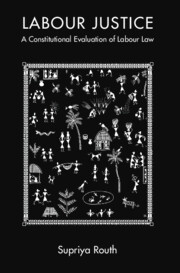Book contents
- Frontmatter
- Dedication
- Contents
- Preface
- Acknowledgements
- Introduction: The Law of Labour—Evaluating the Labour Law Reforms
- 1 Labour’s Constitution: Pursuing Economic, Social and Political Justice
- 2 Individual Autonomy, Freedom of Contract and the Labour Market
- 3 Solidarity and Social Welfar
- 4 Industrial Democracy and Republican Citizenship: Collective Action in Resource Redistribution
- Conclusion: Realising Labour Justice
- Bibliography
- Index
Conclusion: Realising Labour Justice
Published online by Cambridge University Press: 30 April 2024
- Frontmatter
- Dedication
- Contents
- Preface
- Acknowledgements
- Introduction: The Law of Labour—Evaluating the Labour Law Reforms
- 1 Labour’s Constitution: Pursuing Economic, Social and Political Justice
- 2 Individual Autonomy, Freedom of Contract and the Labour Market
- 3 Solidarity and Social Welfar
- 4 Industrial Democracy and Republican Citizenship: Collective Action in Resource Redistribution
- Conclusion: Realising Labour Justice
- Bibliography
- Index
Summary
The purpose of this concluding chapter is not merely to reprise the major arguments made in the book and condense its main thesis. Instead, building on the arguments made in the book, this chapter aims to be future-guiding and discusses a potential alternative approach to labour law, particularly from an Indian and more generally from a Global South perspective. It is hoped that some of the future-guiding reflections offered in this chapter will aid the way labour law is debated, practised and interpreted in the country, by both policy and legal practitioners, including the judiciary. Of course, some of the main arguments of the book are revisited here, but they occupy a limited part of this chapter. In revisiting the main arguments of the book, the intention is to emphasise the understanding of labour law in light of the specific requirements under the Constitution of India. In discussing an alternative approach to labour law, this chapter also indicates some potential areas for future scholarly explorations. After this more general introduction to the chapter, in the first section, the foundations of labour law in India, as conceived under the Constitution, are revisited. Drawing on this discussion, the second section offers a more general take on the alternative social justice-based theorising of labour law. The third section is devoted to the discussion of the overall orientation of the 2020 labour law reforms. The chapter ends (fourth section) with a note on overcoming the dependent juridical mentality, which has historically constrained an alternative conceptual formulation of labour law in India, in view of the contextual realities of the country.
This book argued that labour law furthers the social justice mission of the Constitution, which is conceived in relation to social cooperation among worker-citizens of the country. Labour law is, then, an instrument to practically realise the constitutional commitment made to worker-citizens. In so realising the constitutional commitment, the challenge for labour law is to sustain the balance among the different aspects of the social justice mission envisaged under the Constitution. It is this balance among the three components of social justice – market freedom, social solidarity and participatory deliberation – that gives the idea of social justice its unique Indian character.
- Type
- Chapter
- Information
- Labour JusticeA Constitutional Evaluation of Labour Law, pp. 170 - 199Publisher: Cambridge University PressPrint publication year: 2024

